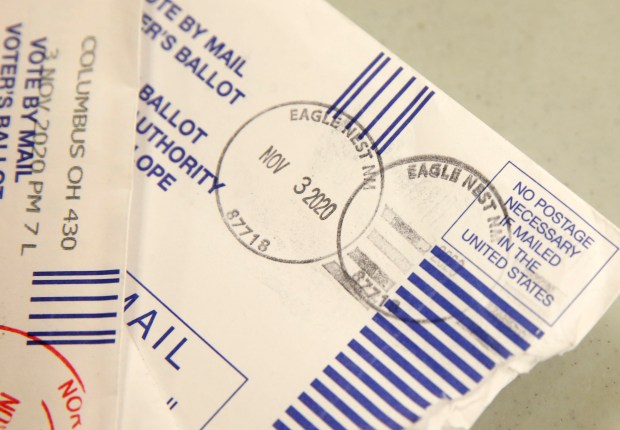A conservative legal organization is ratcheting up its opposition to the requirement in Illinois that mail-in ballots be counted for 14 days after Election Day by calling on the U.S. Supreme Court to reverse federal court rulings that upheld the law because three Republican plaintiffs lacked the legal standing to challenge it.
The appeal, filed Tuesday by the organization Judicial Watch, also asks the nation’s highest court to clarify rulings about who has the right to appeal post-Election Day challenges, after many lawsuits contesting individual state results of the 2020 election filed on behalf of Donald Trump were tossed for lack of standing. Judicial Watch was among several groups that assisted Trump in seeking to halt the counting of mail-in ballots after Election Day four years ago when Trump lost to President Joe Biden.
The appeal to the Supreme Court comes less than a month after a federal appeals court in Louisiana sided with Republicans and ruled Mississippi’s law allowing mail-in ballot counting after Election Day violated federal law.
At issue in the Illinois case is a 2015 state law that requires the counting of mail-in ballots that are postmarked or voter-signed and certified by Election Day and arrive within the following 14 days.
In May 2022, Judicial Watch led the legal team that brought the suit on behalf of U.S. Rep. Mike Bost, now a five-term Republican congressman from Murphysboro, and two GOP Trump electors, alleging the post-Election Day ballot counting violated the federally established date for federal general elections.
The lawsuit also maintained Bost suffered harm from the law by being forced to pay campaign poll watchers to monitor the post-Election Day counting. The suit also contended those mail-in ballots “diluted” votes that were “timely” cast up to and on Election Day.
The U.S. Justice Department has supported upholding the Illinois law in part to ensure that military ballots cast overseas are counted. Bost is a Marine veteran.
In July 2023, U.S. District Judge John Kness dismissed the suit for lack of standing. Kness also rejected the suit based on the merits of the case, saying the Illinois law complied with the U.S. Constitution as well as federal election law.
Kness, a Trump appointee, ruled the state law “does not conflict with the federal mandate that Election Day be held on the Tuesday after the first Monday in November” and that “by counting only mail-in ballots postmarked on or before Election Day, the statute does not extend the day for casting votes in a federal election.”
Addressing an appeal of Kness’ ruling, a three judge panel for the 7th U.S. Circuit Court of Appeals on Aug. 21 ruled 2-1 in siding with Kness that the challengers lacked standing to bring the lawsuit because they failed to allege an injury.
The panel’s majority, which was made up of one justice appointed by Trump and the other appointed by President Barack Obama, said the alleged harms faced by Bost and the others were “generalized” and speculative.
Noting Bost won reelection in 2022 with 75% of the vote, the panel called the downstate congressman’s claims he was harmed for having to hire poll watchers an attempt by Bost to “manufacture standing by choosing to spend money to mitigate … conjectural risks.” Unofficial returns show Bost winning reelection this month with more than 74% of the vote.
Mail-in voting has grown in popularity in recent years, with more than 1.2 million ballots being cast in the 2024 general election as lawmakers have encouraged the practice by allowing voters to permanently apply to vote by mail. In the midst of the COVID-19 pandemic, the 2020 general election saw more than one-third of the ballots in Illinois cast by mail. And in the 2022 general election about 18% of the votes statewide were cast by mail.
Democrats in Illinois and nationally have traditionally mounted strong vote-by-mail programs — a voting strategy Republicans adopted this year after Trump reversed his opposition to mail-in voting when he falsely claimed in his losing 2020 campaign that such ballots were rife with fraud.
But the issue of post-Election Day ballot counting in Illinois, among about 20 states nationally that have such a provision, could face changes as a result of an Oct. 25 ruling on a Republican-backed lawsuit by the conservative 5th U.S. Circuit Court of Appeals, which oversees Mississippi, Louisiana and Texas.
That appeals court ruled Mississippi’s law allowing mail-in ballot counting five days after Election Day violated federal law. An appeal of the ruling to the U.S. Supreme Court is likely and Justice Watch attorneys noted in their Illinois appeal to the high court that the “strength” of its case has “improved” as a result of the 5th Circuit ruling.
By having the U.S. Supreme Court overturn the Illinois rulings and remand the case to the lower courts, it would allow them “to consider the merits of the important questions raised by the petitioner’s claims,” Justice Watch contended.





